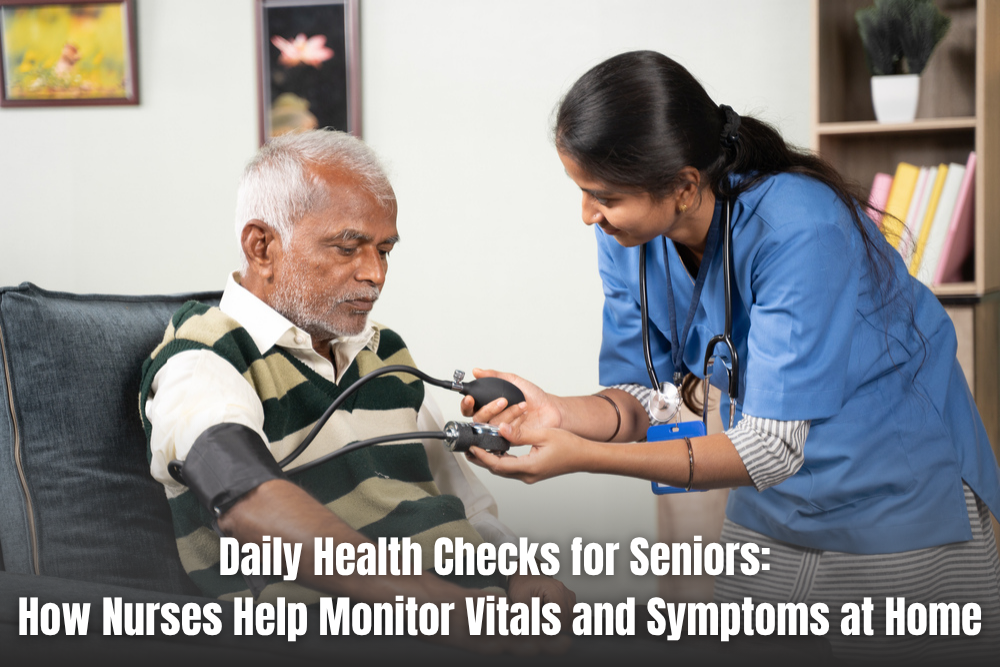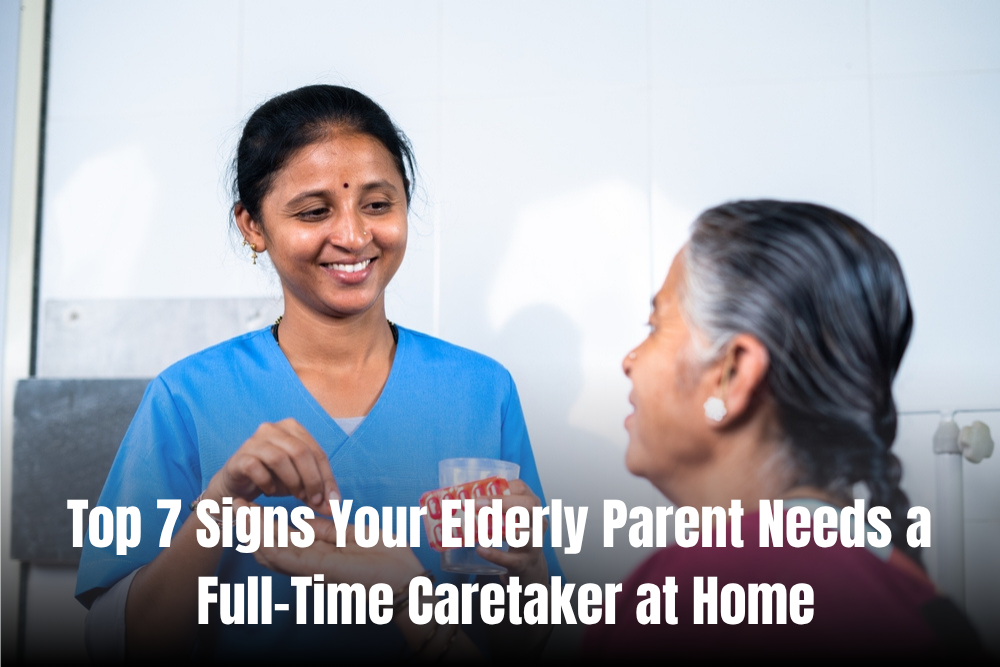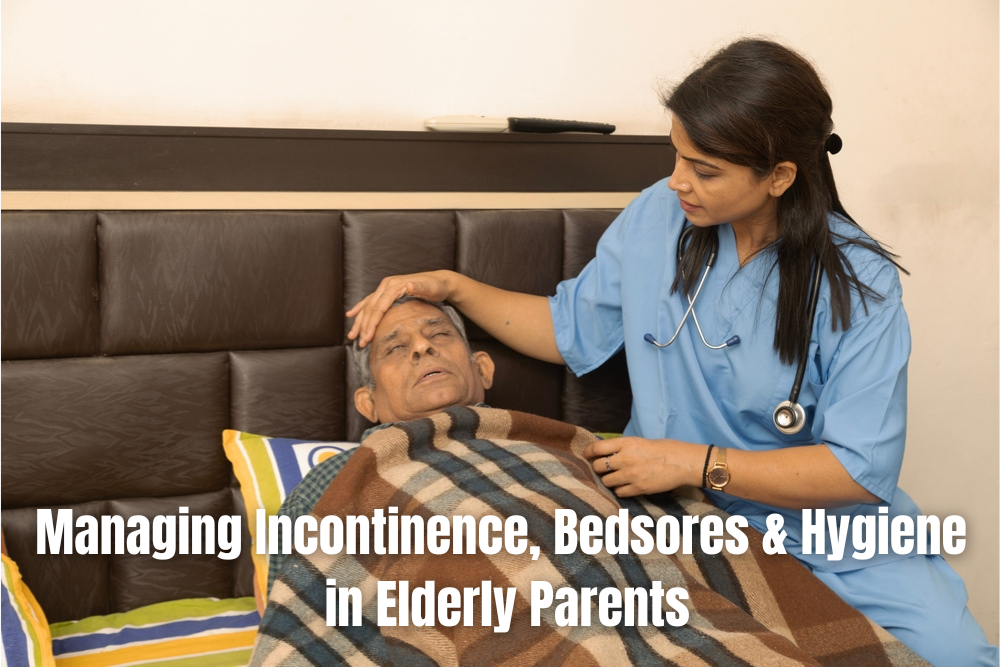As our parents and grandparents age, their health becomes more delicate and keeping a close eye on it becomes essential. Daily monitoring of vital signs and symptoms helps catch health issues early, prevent emergencies, and give families peace of mind. But managing this on your own can be difficult.
That’s where trained home nurses come in.
In this article, you’ll learn how nurses support seniors with daily health checks at home, what vitals they monitor, the benefits of this routine, and how it helps detect early signs of health issues. Whether your elderly parent has diabetes, heart problems, or just needs regular observation, this guide will help you understand the value of a nurse’s role in daily elderly care especially in India.
Why Are Daily Health Checks Important for Seniors?
As people age, their immunity gets weaker, and they become more prone to:
- Blood pressure fluctuations
- Irregular heartbeat
- Breathing difficulties
- Sudden infections
- Sugar level changes
Many of these changes happen quietly and are not visible at first. A nurse who checks these signs daily can spot problems early and prevent serious complications.
What Vitals Do Home Nurses Monitor?
Here are the key health checks nurses perform every day at home:
1. Blood Pressure (BP)
High or low BP is common in seniors and can lead to strokes or weakness. Nurses track daily readings and report changes.
2. Heart Rate (Pulse)
An irregular pulse can be a sign of heart issues or dehydration.
3. Blood Sugar (Glucose)
Especially important for diabetic patients. Nurses monitor sugar levels before and after meals and adjust care as needed.
4. Oxygen Level (SpO2)
Using a pulse oximeter, nurses ensure that oxygen levels stay within the normal range—crucial for those with breathing or lung issues.
5. Temperature
Even a slight fever in seniors can be serious. Nurses track body temperature daily.
6. Weight & Appetite
Weight loss, gain, or loss of appetite can signal problems like infections or digestive issues.
7. General Symptoms
A good nurse also watches out for:
- Fatigue
- Breathlessness
- Pain or swelling
- Dizziness or confusion
- Changes in urination or bowel habits
Benefits of Having a Nurse Do Daily Health Monitoring
- Early Detection: Spotting small issues before they become emergencies
- Timely Medication: Nurses ensure medicines are given correctly and on time
- Accurate Reporting: Keeps family and doctors informed with regular health updates
- Emotional Support: Nurses often form a bond with seniors and offer emotional comfort
- Professional Observation: Nurses are trained to notice subtle signs a family member might miss
When Do You Need a Nurse for Daily Health Checks?
You should consider hiring a nurse if your parent:
- Has a chronic condition like diabetes, hypertension, COPD, or heart disease
- Is recovering from surgery or hospital discharge
- Has difficulty moving or communicating
- Lives alone and needs regular supervision
- Has had sudden health issues in the past
How Shree Swami Samarth Patients Seva Can Help
At Shree Swami Samarth Patients Seva (www.sssps.in), we offer trained and experienced nurses for home visits and 24/7 care across India. Our nurses are skilled in:
- Monitoring vital signs
- Handling elderly patients with respect and care
- Communicating with doctors and families
- Providing both medical and emotional support
Whether you need short-term post-hospital care or daily long-term help, we’re just a call away.
FAQs About Daily Health Monitoring for Seniors
Q1. Can I monitor my parent’s vitals myself?
You can—but a trained nurse knows what changes are normal or dangerous. Their observation is more accurate.
Q2. How often should vitals be checked?
For elderly patients, once or twice daily is ideal. Some may need round-the-clock observation depending on their condition.
Q3. Are nurses trained to handle emergencies?
Yes, our nurses are trained in basic emergency response and know when to call for medical help.
Q4. Is this service available in smaller cities?
Yes, Shree Swami Samarth Patients Seva provides services in many cities across India. Contact www.sssps.in to check availability.
Q5. Will the nurse update us regularly?
Absolutely. You’ll receive updates on your parent’s health status so you stay informed even from afar.
Conclusion
Daily health monitoring is not just about numbers it’s about keeping your loved one safe, comfortable, and cared for. With the help of a trained nurse, your elderly parents can enjoy a better quality of life, while you stay tension-free knowing they’re in expert hands.
Let Shree Swami Samarth Patients Seva be your support system. Our dedicated nurses offer more than care, they offer peace of mind.
Visit www.sssps.in to learn more or schedule a nurse for your home today.




